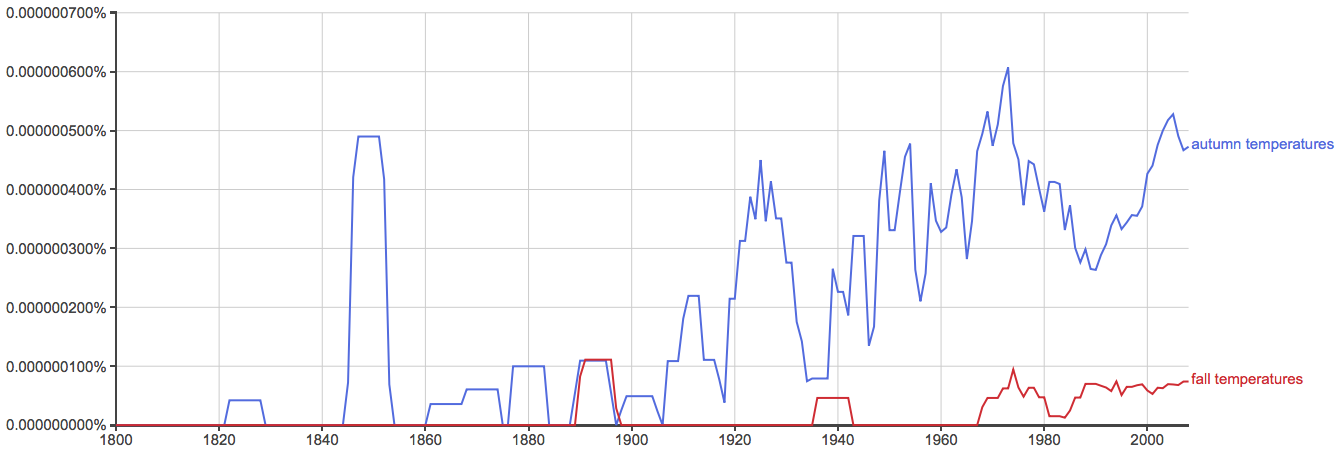Some writers use fall to describe the season just before winter, and other writers use autumn to mean the same thing.
Which word is correct? Does it even matter?
In reality, these words are interchangeable in most contexts. Sometimes, one or the other might be preferred, but at least today, both words are accepted in the context of seasons.
What are those rare instances where autumn is a better choice than fall, or vice versa? I’ll discuss them in this post.
What is the Difference Between Autumn and Fall?
In this post, I will compare autumn vs. fall, both of which refer to the season that follows summer. I will use each word in example sentences, so you can see it in context.
Plus, I will show you a helpful memory tool that you can use to help you decide whether autumn or fall more accurately describes the season to which you refer.
When to Use Autumn
 What does autumn mean? Autumn is a noun. It refers to the season that occurs between summer and winter. Autumn is also used as a feminine name, in which case it functions as a proper noun and should always be capitalized.
What does autumn mean? Autumn is a noun. It refers to the season that occurs between summer and winter. Autumn is also used as a feminine name, in which case it functions as a proper noun and should always be capitalized.
Autumn is an old word—it has origins in Latin and carried through to modern use through Middle English. It was first recorded in its current form in the 14th century.
The sentences below are examples of the correct use of autumn.
- Every autumn, John goes into the woods behind the cabin and draws maple syrup from the old trees, just like Grandpa used to do.
- In the Northern Hemisphere, autumn is typically a season of falling temperatures and brightly colored leaves.
- The goats eventually learn to do it themselves. In the autumn, when there is little food on the ground, they spend most of their time grazing the treetops. –The New York Times
When to Use Fall
 What does fall mean? Fall, of course, has several meanings, many of which mean to slip or to drop. In this article, I will focus on its use as a synonym of autumn—namely, as a noun that refers to a season.
What does fall mean? Fall, of course, has several meanings, many of which mean to slip or to drop. In this article, I will focus on its use as a synonym of autumn—namely, as a noun that refers to a season.
For example,
- This fall, Dana will be in 11th grade at Mickey Mantle High School.
- I started a new job last fall as foreman of a construction company.
- Honeywell International Inc. will decide whether to break off its aerospace division by the fall, the company said Tuesday, and it continues to work with advisers after activist Third Point LLC made a public push last month for a spinoff. –The Wall Street Journal
Fall is also a very old word, and has been used to describe the autumnal season for several centuries. It is more popular in American than British English, as the charts below demonstrate.
Fall vs. Autumn in American English

Fall vs. Autumn British English

Fall or Autumn? When to Use Each
At least in the context of seasons, these words are more or less interchangeable. There is a clear preference for autumn in British English and for fall in American English.
Both words are accepted in both usage communities, though. You could get away with either, although British readers will probably raise an eyebrow if you use fall whereas American readers wouldn’t bat an eye if you used either word.
Autumn is the more formal of the two, and, in America at least, people might look at you strangely if you routinely used autumn instead of fall in your daily conversation. In writing, however, no one will take any notice. Both terms are interchangeable.
Summary
Is it autumn or fall? Autumn and fall are words for the season that happens between summer and winter. Fall also has several other meanings.
To summarize,
- Both words are standard.
- Autumn is a more formal way to refer to the season.
- Fall is less formal than autumn.
- Both words are interchangeable.
Contents
